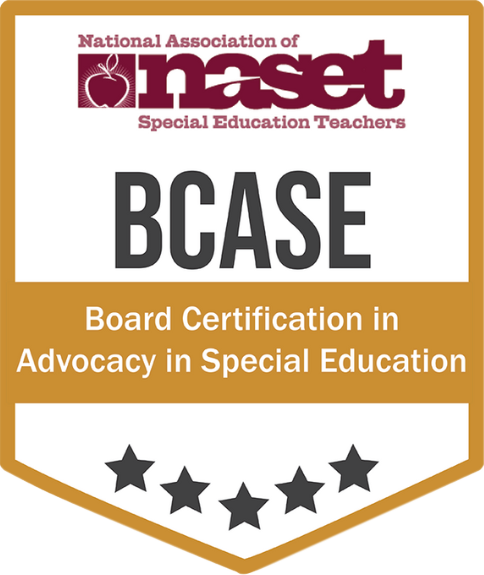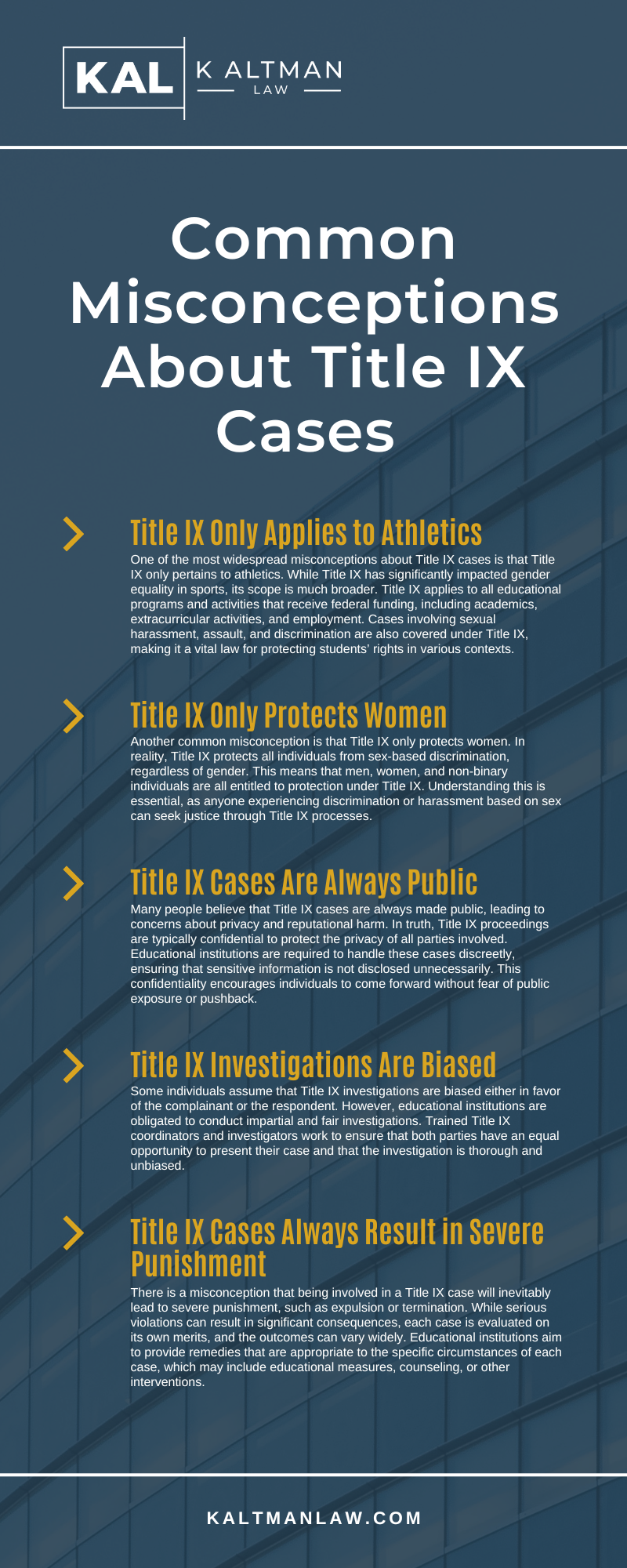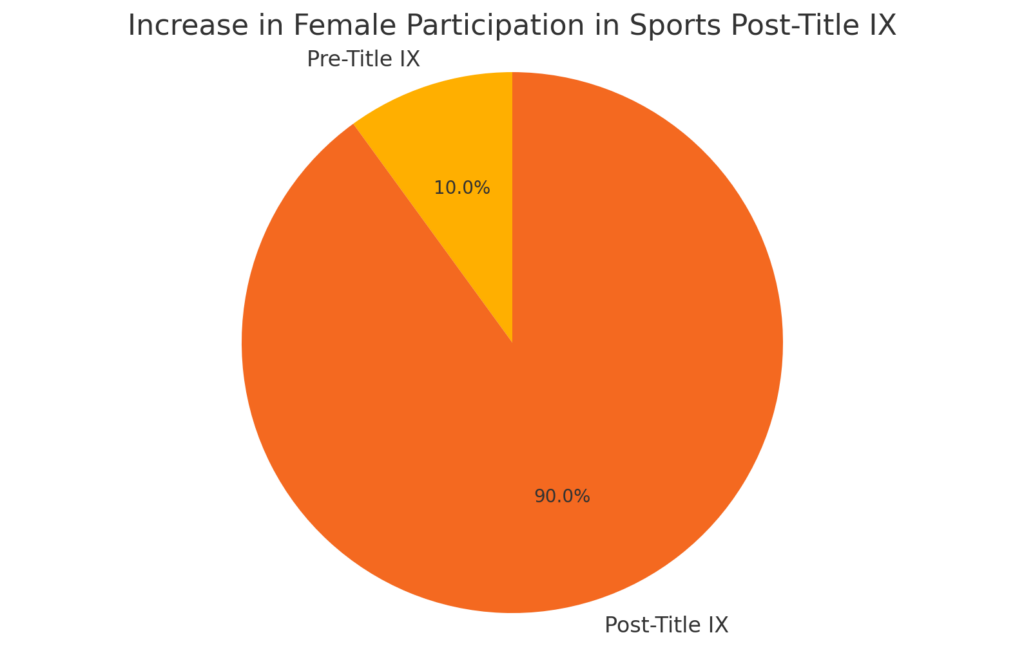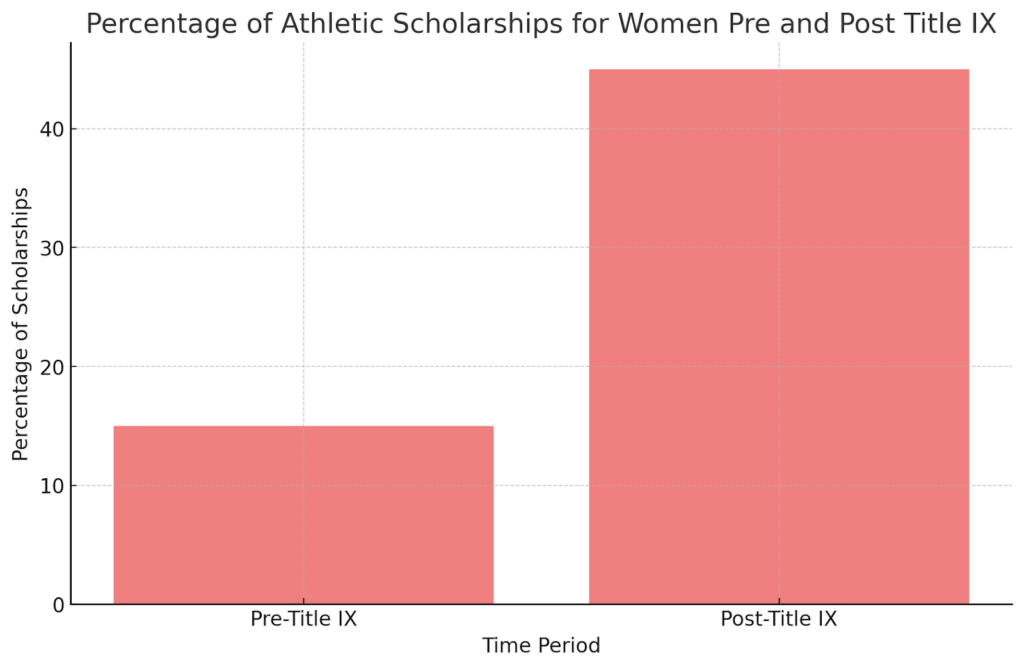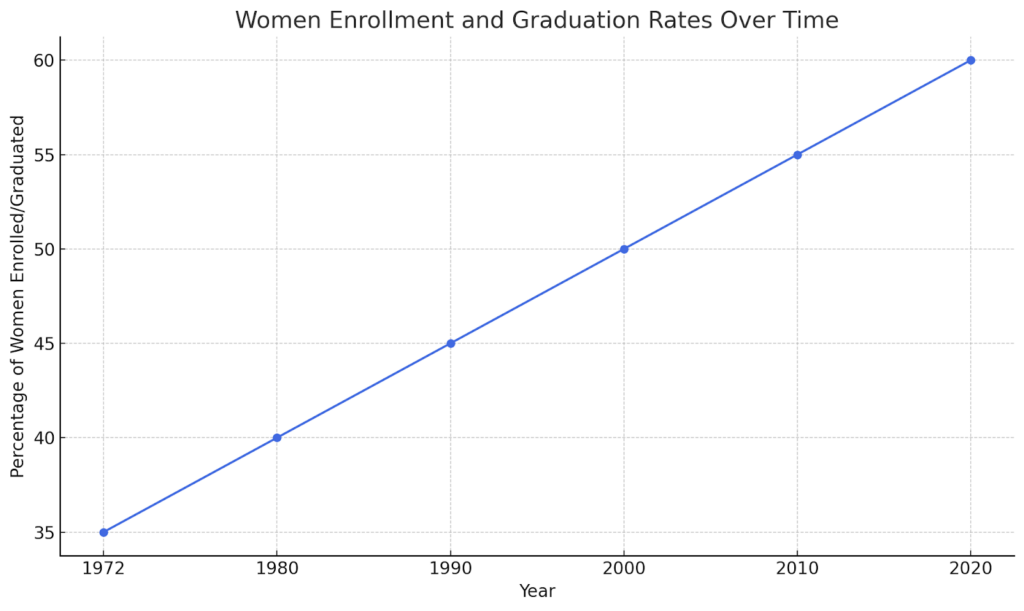K Altman Law:
Your Trusted Partner for Title IX Advocacy
Understanding Title IX
Title IX is a federal civil rights law that prohibits gender-based discrimination in any education program or activity receiving federal funding. Since 1972, Title IX has been significantly impacting educational settings, making sure everyone, regardless of their gender, gets a fair chance in all areas of education. Title IX not only ensures gender equity in athletic programs but also deals with sexual harassment and sexual violence in schools and universities. Title IX is key in promoting a safe and equitable educational environment by mandating schools to provide equal opportunities and protections to all students and educational professionals, allowing them to speak out if they witness or experience discrimination or harassment.
Many students and parents who are trying to discover what a Title IX investigation entails may have the following questions:
- What are the consequences of a Title IX investigation?
- How is Title IX used?
- What are the origins of Title IX?
- What is the substantive content of Title IX?
- What is Title IX?
The answers to these questions may vary depending on the circumstances of your particular case. Title IX has a long history, and it can be difficult to understand every aspect of Title IX and how it applies to universities, colleges, and other educational institutions in the United States who receive federal funding. Students typically make Title IX allegations against other students. The following guide offers a brief overview of Title IX and how it is enforced.
Title IX is a federal law enacted by the United States Congress in 1972. The law states the following:
No person in the United States shall, on the basis of sex, be excluded from participation in, be denied the benefits of, or be subjected to discrimination under any education program or activity receiving Federal financial assistance.
Title IX is not a law, but an amendment. It is one of many amendments to the Higher Education Act of 1965. The amendments together are termed the Education Amendments of 1972. Title IX is one of the most commonly litigated amendments. The influence of Title IX on higher education and secondary education in the United States has been enormous. Title IX, in essence, establishes the guarantee that every student is free from sex-based discrimination. To enforce the provisions of Title IX, federal law mandates that federal funding will be withheld from educational institutions that do not enforce Title IX. All schools receiving federal funding must implement policies and procedures that sanction and reduce sex-based discrimination and harassment.
Steps Involved in a Title IX Case
Title IX proceedings in educational institutions involve handling sex-based discrimination complaints, including sexual harassment and sexual assault. The process starts when someone files a Title IX complaint, and then the school’s Title IX office assesses the complaint to see if it fits under Title IX. If it does, a Title IX investigation starts where the required evidence is gathered, like, texts, emails and statements, and a live hearing is held. Both the person who complained (the complainant) and the one accused (the respondent) get to have advisors, maybe even lawyers, to help them out. During the hearing, both sides get to tell their story and present evidence and witnesses. After that, the decision is made by a panel, with sanctions varying from campus restrictions to expulsion. If someone’s not happy with the decision, they can appeal. This process can change depending on the current federal policies [Link to who administers TItle IX in the background page].
Insights
Details Regarding Equal Rights Related to Title IX
Title IX relates to equal protection and the reduction of sex-based discrimination in schools receiving federal funding. Title IX specifically refers to schools using sex to exclude or deny benefits to any students. The language of Title IX refers to any activity that receives federal funding, not only educational activities. One example concerns sports-related activities in universities, colleges, and secondary schools. Students cannot be denied the right to participate in athletic programs based on their sex. Women cannot be denied the benefits offered to men at their educational institution.
Discrimination of any kind based on sex is prohibited under Title IX. What constitutes “discrimination” has had to be interpreted over since Title IX was enacted by the United States Congress. Any conduct or activity that limits the rights a woman has to the same educational opportunities as males is discrimination under Title IX. Denying female students the rights to apply to scholarships, and treating females in an unequal manner in the classroom, are examples of discrimination under Title IX. Sexual harassment and relationship violence also fall under the purview of Title IX.
Many guidelines exist that help educational institutions interpret Title IX. The following are specific guidelines that constitute prohibited conduct under Title IX:
- Interfering in any right, privilege, advantage, or opportunity held by an individual
- Aiding a person, organization, or agency in practicing sexual discrimination
- Applying housing regulations and rules in a discriminatory manner on the basis of sex
- Not permitting a person to have specific services or benefits on the basis of sex
- Giving a person different services or benefits on the basis of sex
- Unequal treatment when making decisions regarding services, benefits, and financial aid
The Difficulty Defining Aspects of Title IX
Many interpretations may apply to what constitutes interfering in an individual person’s rights and opportunities. Direct and indirect actions may fall under the provisions of Title IX. Many problems arise when students attempt to determine what behavior is regulated. Authorities interpreting this language have applied it across many different types of conduct and behavior. Any action may conceivably interfere with an individual’s education, including sexual misconduct and harassment. Sexual assault is based on a female student’s sex, and this act prohibits her from enjoying every benefit of her education.
Not acting to prevent sexual discrimination may violate the provisions of Title IX. Educational institutions must actively respond to any student behavior that may violate Title IX, and they must attempt to stop discriminatory acts from occurring. Also, educational institutions must institute policies and procedures designed to prevent these behaviors from happening.
Specific Regulatory Guidelines
Federal regulations attempt to provide educational institutions with guidelines regarding Title IX and its interpretation. Universities, colleges, and secondary schools have assistance with investigating sexual misconduct accusations. Also, Title IX coordinators and investigators go through an extensive training period. Universities and colleges throughout the United States participate in the standardization of Title IX policies. Every presidential administration since 2000 has instituted new guidelines for enforcing Title IX.
The History of Title IX
Title IX was created to reduce instances of sexual discrimination in universities, colleges, and secondary schools in the United States. However, Title IX has been interpreted and expanded since it was first enacted in 1972. This process of interpreting and assessing Title IX is ongoing. Some new aspect of Title IX is always coming up in new cases and opinions
Know Your Rights Under Title IX
Under Title IX, students have the right to a fair and supportive learning environment free from gender-based discrimination and harassment. If you’re accused of any type of sexual misconduct, due process means you should be clearly informed about the accusation, and get a fair chance to tell your side of the story, a fair investigation, a decision based on evidence, and an opportunity to appeal if you’re not satisfied with the decision.
Misconceptions often arise regarding these rights. That’s why it’s important to seek legal advice and understand the disciplinary process. At K Altman Law, our student defense team can take you through the whole process of your Title IX case, help you understand your school’s policies, and your rights and responsibilities in this matter, offering guidance from initial legal consultation to hearing representation.
The Reasons for Enacting Title IX
Title IX arose during an important time in the legislative history of the United States. Most universities and colleges in the United States in the mid-twentieth century were not amenable to providing women with everything they needed to take advantage of their time as college students. Many private universities and colleges had only admitted women a few decades before Title IX was enacted by the United States Congress. In some instances, women were not granted admission to some universities and colleges until 1970.
During these decades, universities and colleges had different atmospheres than they do today. Dress codes, student conduct, and how students presented themselves were more important to universities and colleges during the 1960s and 1970s. Female students were often subjected to greater disciplinary measures than their male counterparts. Some campuses restricted how female students could dress and how late they could be outside of their dormitories.
During this important period when women were gaining access to higher education, many universities and colleges were not welcoming to female students. Specific areas of study were denied to some female students at universities and colleges. Women during this time were sometimes denied scholarships or admission to specific courses due to discrimination based on their sex.
In the midst of this discrimination, the United States Congress enacted Title IX. The women’s rights movement and Title IX both advanced the equal treatment of women in the United States. Women now constitute the majority of undergraduate students in the United States. Universities and colleges have become less discriminatory toward women over time.
Title IX and Athletics
When it was first enacted, Title IX was most often applied to cases involving college athletics. Sports that received financial support from alumni and outside resources were not regulated under Title IX. Only sports teams that received funding from the federal government were regulated under Title IX.
Title IX and Sexual Misconduct
Many new issues have become prominent during the past decade regarding Title IX and sexual misconduct. Universities and colleges now use Title IX to investigate instances of sexual misconduct. The following questions have become relevant during the past ten years:
- Do universities and colleges possess the resources necessary to investigate sexual misconduct cases?
- Do faculty members and administrators have a duty to intervene if they become aware of instances of sexual misconduct?
- Are accusations of rape, sexual assault, and stalking applicable to the definition of discrimination under Title IX?
- Should educational institutions be liable for instances of sexual misconduct?
- Are sexual offenses related to education at universities, colleges, and secondary schools?
Title IX and Executive Authority
The executive branch is responsible for administering Title IX. Beginning in the 1990s, presidential administrations have altered how they interpret and implement the provisions of Title IX. For example, universities and colleges under the Clinton administration were tasked with preventing, eliminating, and remedying sexual harassment.
The Obama Administration altered the landscape of Title IX when it issued the Dear Colleague letter. Policies outlined in this letter lowered the evidentiary standard for sexual misconduct cases from a “clear and convincing” standard to a “preponderance of the evidence” standard. Also, the letter made Title IX applicable to speech that made a member of the opposite sex uncomfortable.
During the first Trump Administration, the Secretary of Education set forth reformed rules stating how universities, colleges, and secondary schools should investigate instances of sexual misconduct. The Trump administration restricted how discrimination was defined under Title IX. Also, universities, colleges, and secondary schools were only responsible for investigating incidents that occurred on campus property. Respondents were also guaranteed the right to a hearing. Complainants and respondents were also given the right to examine and cross-examine witnesses.
The Biden Administration intended to enlarge Title IX to include discrimination based on gender identity and sexual orientation. Title IX will continue to evolve as each new executive administration takes office.
What Are the Origins of Title IX Accusations?
Being accused of violating Title IX may confuse some students because they do not know from where or from whom the accusation originates. Students are often shocked to learn that the Title IX accusation likely originated from a person they know personally and with whom they have a close relationship.
Being accused of committing sexual misconduct is a serious matter. Students accused of sexual misconduct under Title IX must go through an intense investigation phase and a Title IX hearing. The sanctions for students found to have committed sexual misconduct can affect every aspect of their lives.
Title IX: The Procedures Applicable to Respondents
Title IX procedures are often revised depending on which political party occupies the executive branch of the federal government.
Every university and college in the United States must have a Title IX Compliance Officer. Title IX complaints are directed to the Title IX Compliance Officer. A staff under the compliance officer will be larger or smaller depending on the size of the university or college.
Students are typically provided with multiple methods of filing a Title IX report. Some universities and colleges offer online reporting documents. Faculty members, administrators, fellow students may also be obligated to report a Title IX violation if they have knowledge of the misconduct. Every complaint passes through the Title IX office at the university or college.
The Title IX officer must decide whether to launch an investigation and follow through on pursuing the Title IX report. Universities and colleges risk losing federal funding if they do not adhere to the provisions of Title IX, so the vast majority of Title IX reports are investigated by the Title IX office.
Informal Resolution
Universities and colleges may propose informal resolution as one option for resolving a Title IX investigation. Both the complainant and the respondent must agree to the informal resolution process. Either party has the right to end the informal resolution program and continue the Title IX investigation. Universities and colleges cannot force complainants or respondents into developing an informal resolution.
The Hearing
Title IX cases in universities and colleges are not exactly the same as Title IX cases conducted in secondary schools. Hearings are optional during Title IX cases at secondary schools, but both the complainant and the respondent are granted the right to a hearing during Title IX investigations at universities and colleges.
All hearings conducted during Title IX investigations must be live, but the complainant and respondent may request hearings be conducted on closed-circuit video. The Title IX office at the university or college will schedule the hearing and assign a panel to analyze the evidence. A panel may consist of students, administrators, and faculty members. These panel members typically receive training under the direction of the Title IX office.
The panel members will hear the facts of the case and scrutinize all witness statements and evidence before rendering a decision. Panel members may analyze the report prepared by the Title IX investigator, but the members cannot rely only on this document when making their decision.
The claimant and respondent may provide their opening and closing statements during the Title IX hearing. Advisors often represent complainants and respondents and they may cross-examine witnesses and each other. Also, advisors may ask questions during the Title IX hearing.
After the evidence is presented, the panel members will meet and decide whether the respondent is responsible for the allegations made by the complainant. An individual may hear the evidence in the case, and this person will be able to render a final decision. When a panel makes a decision, a majority must be in agreement. Decision makers also use the lower “preponderance of the evidence” standard that only requires the decision makers to determine if an event is “more likely than not” to have happened
Appealing a Decision
The complainant and the respondent both have the right to appeal the decision rendered. In most circumstances, the appeal is directed to the provost or the university president. Some appeals are restricted to unique facts and specific cases. Appeals are typically performed when the following conditions arise:
- A clear demonstration of bias
- Definitive mistake was performed during Title IX procedures
- New evidence is available relating to the case.
The majority of appeals are denied, and a university president will rarely overturn the decision of the Title IX panel.
Title IX procedures continue to evolve over time. It is important that you retain our student defense lawyer if you are facing Title IX allegations. Contact K Altman Law today to schedule a consultation. We have years of experience representing clients who are parties in Title IX cases. Call K Altman Law at (248) 236-5830 to learn more about the legal services we offer.
Investigations
The Title IX office at a specific university or college will have to make the decision to begin an investigation. A Title IX officer will initiate an investigation by assigning an investigator to a case. Multiple investigators may be assigned to particularly complicated cases. Investigators do not need any unique license or qualification. Faculty members, administrators, legal professionals, and others may act as Title IX investigators.
A Title IX investigator will notify both the complainant and the respondent that a Title IX investigation is ongoing. Typically, both parties receive a letter and an e-mail, but universities and colleges may choose other methods of notification. Also, a Title IX investigator will instruct the complainant and the respondent regarding their right to choose an advisor. Oftentimes advisors are attorneys, but this is not always the case. Universities and colleges also offer students access to psychological counseling and medical treatment. Complainants are more likely to receive offers of assistance from their university or college.
A Title IX investigator will spend their time collecting evidence related to the facts of the case. Examples of relevant evidence include emails, dormitory logs, text messages, and clothing. The evidence considered by the Title IX investigators will also include oral and written statements made by the complainant and the respondent, as well as statements made by witnesses.
Title IX places the burden of collecting evidence on the university or college, not the parties. Complainants and respondents are not tasked with gathering evidence. Although the institutions and Title IX investigators are supposed to be neutral regarding investigations, complainants are often given special treatment. Respondents may therefore feel confused and intimidated during the process.
Investigators must complete their reports within set timelines. The periods range from thirty to ninety days. The complainant and the respondent each have ten days to submit a response to the report before it is transmitted to the Title IX office. However, Title IX investigations may last for months and even years. It is important to be prepared for the long-term.

Sanctions Under Title IX
A university or college cannot place you in prison for sexual misconduct. However, institutions of higher learning have a range of sanctions that apply to students determined to have committed sexual misconduct. Some examples of these possible sanctions include revoking your on-campus housing privileges, restricting your school email account, and mandatory psychological counseling. Most universities and colleges punish students found to have committed sexual misconduct with suspension or expulsion.
It is important for you to understand that Title IX applies to individual educational institutions, not students. It prohibits schools from discriminating against students on the basis of sex. Schools who do not adhere to the provisions of Title IX face severe financial penalties. The university, college, or secondary school determines which sanctions students must face.
Expulsion typically comes with a notation on your academic record regarding the reason for the expulsion. If you are facing Title IX allegations, you want to do everything within your power to avoid expulsion. It can be difficult to obtain admission to other schools with a violation on your record.
What Should I Do if I Am Accused of a Title IX Violation?
If you discover you are facing allegations regarding a Title IX violation, remain calm and focused. Take it one step at a time. The following are some of the things you should do if you are accused of a Title IX violation.
Maintain Your Normal Life
You need to focus on staying calm and relaxed during this stressful time in your life. You should try to seek medical treatment if you are experiencing severe depression or anxiety. It is also important to maintain a regular routine. Attend class, play sports, and enjoy the hobbies you had before you were the subject of a Title IX investigation.
Stay in contact with family and friends while you are going through the process. Supportive people can help you think long-term about the Title IX action and the importance of your education.
Speaking With Witnesses
Create a list of potential witnesses who may be able to help you and your student defense lawyer. Both character witnesses and fact witnesses may be helpful during Title IX cases. Fact witnesses recall first-hand accounts of what occurred during a specific place and time. Even second-hand accounts are permissible in Title IX cases. A witness who only heard about a fact may testify.
Character witnesses testify regarding a party’s reputation and behavior. An individual who has known you for a long period of time will be a good character witness. It is important to identify any witnesses who may contribute to your Title IX case.
Collecting Evidence
Do not take it upon yourself to investigate every aspect of your Title IX case. You can take steps to make sure you have a robust defensive strategy regarding the allegations you are facing.
Collect any items of physical evidence concerning the events related to your Title IX case. You should also collect documentary evidence related to the investigation. Examples of important items of evidence include video recordings, photographs, and articles of clothing.
You should not destroy evidence out of fear that it will harm your case. Our Title IX lawyer can help you determine which items of evidence will be useful to your case. You can keep a journal that describes how the case is affecting you. Also, consider writing down a timeline and list of facts regarding your case.
Do Not Speak to the Complainant
Do not speak to the complainant under any circumstances. Universities and colleges typically demand that the complainant and respondent not communicate during the Title IX investigation. Although you may want to speak with the complainant, you must refrain. Do not call, text, or otherwise communicate.
You cannot assume that the person who asserted a Title IX complaint against you is trustworthy. They may accuse you of harassment if you try to contact them. A complainant may even request a no-contact order to prevent you from even being physically near them. Do not send messages to the complainant through other people, and do not speak to them on social media applications.
Do Not Speak to Others
Speak with our student defense lawyer before you contact anyone about your Title IX case. You should not discuss the facts of your case with anyone except our attorney, your parents, and a close friend.
You may believe that the university or college you attend will help you, but it is important for you to realize that the institution will protect its own interests. Do not speak to the school or the media. Our Title IX lawyer will help you deal with every aspect of your case.
Title lX Statistics
Title IX, enacted in 1972, is a U.S. federal law prohibiting discrimination based on sex in education programs or activities that receive federal financial assistance. The law has had a profound impact on various aspects of education, particularly in promoting gender equity in sports, admissions, and student treatment.
Key Statistics
- Participation in Sports: Title IX has significantly increased opportunities for women in sports. Before Title IX, women’s participation in collegiate sports was relatively low, but over time, the number of female athletes at the high school and college level has surged. Women’s participation in collegiate sports has increased by over 500% since the law was enacted.
- Athletic Scholarships: The number of athletic scholarships awarded to female athletes has skyrocketed under Title IX. In the years following its passage, the percentage of athletic scholarships awarded to women increased from around 15% to approximately 45% today, aligning with the growth in female athletes.
- Sexual Harassment and Discrimination: Title IX also addresses sexual harassment and discrimination in educational settings. Surveys indicate that approximately 1 in 5 women experience sexual assault while in college, highlighting the ongoing challenges in addressing these issues despite Title IX’s protections.
- Enrollment and Graduation Rates: Title IX has helped to close the gender gap in higher education. As a result of its protections for women, female enrollment in colleges and universities and graduation rates have increased over the years. Today, women outnumber men in college enrollment and graduation rates.
The following charts illustrate key trends:
Title IX FAQs
If you have any questions about Title IX or a specific Title IX case, our Title IX lawyer is here to answer them. Title IX is a federal civil rights law that prohibits discrimination on the basis of sex in education programs and activities that receive federal financial assistance. When issues arise under Title IX, having our knowledgeable lawyer on your side can make a significant difference. If you require assistance, contact our team at K Altman Law today.
Does Title IX Protect the Accused?
Yes, Title IX is designed to protect the rights of all parties involved, including the accused. While it primarily aims to prevent and address sex-based discrimination, harassment, and assault, it also makes sure that those accused of such actions are given a fair and impartial process. This includes the right to be informed of the allegations, the right to present evidence and witnesses, and the right to a fair hearing. As your Title IX attorney, we will work diligently so that your rights are upheld throughout the investigation and adjudication process and that you are afforded all required opportunities and mechanisms to defend yourself.
What Should I Do If I’m Accused of a Title IX Violation?
If you are accused of a Title IX violation, it is imperative to take the accusation seriously and act promptly. Avoid making any statements or admissions before seeking professional legal assistance. Gather any relevant evidence and document your interactions related to the accusation. Furthermore, it is important to cooperate with the investigation while making sure your rights are protected.
How Long Does a Title IX Investigation Typically Take?
The duration of a Title IX investigation can vary depending on the details of the case and the policies of the educational institution. Generally, institutions aim to complete investigations within 60 to 90 days. However, this timeframe can be extended if there are extenuating circumstances. Our team will help you understand the timeline of your case as we work to reach a favorable outcome effectively and efficiently.
What Are the Possible Outcomes of a Title IX Investigation?
The outcomes of a Title IX investigation can vary depending on the findings of the investigation and the specific policies of the educational institution. Possible outcomes may include dismissal of the complaint, disciplinary action such as suspension or expulsion, mandatory training or counseling, and other remedial measures. Our Title IX lawyer can help you understand the potential outcomes based on the specifics of your case and work to achieve the most favorable result.
Can a Title IX Lawyer Help With Appeals?
Yes, our Title IX lawyer can assist with appeals. If you believe that the outcome of your Title IX case was unjust or if there were procedural errors, you have the right to appeal the decision. We can help you prepare a strong appeal by identifying grounds for the appeal, gathering supporting evidence, and presenting a compelling argument to the appellate body.
Contact K Altman Law Today to Schedule a Consultation
At K Altman Law, our seasoned student defense lawyers, led by founder Keith Altman, bring decades of experience in defending students and educational professionals across the U.S. Whether you’re a complainant or respondent, we offer strategic, compassionate representation tailored to your unique situation. If you’re facing a Title IX investigation or need guidance on your rights, trust our Title IX lawyer who is committed to protecting your future. Contact us today for a confidential consultation and take the first step toward clarity and resolution.
Clients' Stories
Securing justice for a student falsely accused (Respondent)
Achieving justice for a victim of Title IX (Complainant)
CONTACT US NOW FOR YOUR CASE CONSULTATION
Areas of Expertise
Attorneys For Sexual Assault and Harassment
Gender Equity Cases
Protecting Rights of Transgender Students
Gender-based Discrimination Victims in STEM Fields
Pregnant and Parenting Students
Protecting LGBTQ+ Student Rights
Sexual Violence and Harassment Cases of K-12 Students
Representing Women in Hiring and Promotion Cases
Protecting Disability Rights in Education Under Title IX
Helping Resident Assistants
Protecting Rights of ROTC Students
Protecting Rights of Female Athletes
Meet the Attorneys

Keith Altman, Esquire
With a deep understanding and an empathetic approach, Mr. Altman has carved out a strong niche in the field of Title IX matters. He has diligently stood by both complainants and respondents, ensuring their voices are heard and justice served. His valuable work spans both the K-12 and university levels, highlighting his commitment to supporting individuals dealing with Title IX matters at various stages of their educational journey.

Solomon M. Radner, Esquire
Partner – Senior Attorney
Solomon M. Radner is a skilled trial attorney who has been successfully litigating high profile cases in the Detroit-Metro area since receiving his J.D. from Wayne State University Law School in 2009. Solomon has received several prestigious honors including being listed as a Super Lawyer since 2014, being recognized as a “Top 40 Under 40” trial attorney in Michigan by the National Trial Lawyers Association, and receiving the Lawyer for Warriors Award from Wayne State University in 2016 for his pro bono work on behalf of military veterans. Mr. Radner proudly fights zealously and effectively on behalf of all his clients to achieve justice.
CONTACT US NOW
FOR YOUR CASE CONSULTATION
Who We Represent
K Altman Law offers nationwide legal representation in Title IX cases for complainants, respondents, as well as teachers and staff in educational institutions. Their expertise covers a broad range of scenarios within Title IX, ensuring comprehensive legal support across the United States.
Our Services
Contact K Altman Law Today
If you are facing Title IX allegations, contact K Altman Law today to schedule a consultation. The dedicated team of academics, legal professionals, and former administrators at K Altman Law has decades of experience working with students involved in Title IX cases. Contact K Altman Law today to schedule a consultation during which we can discuss the facts of your case.


